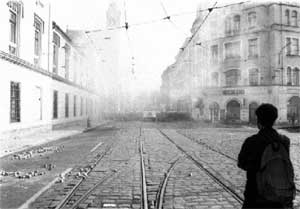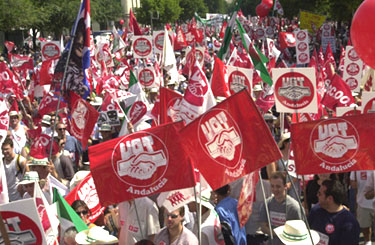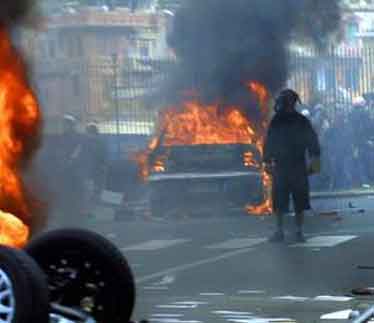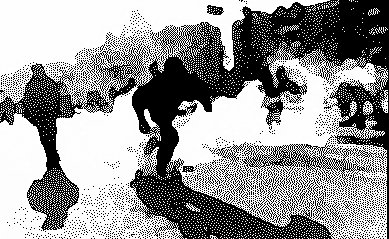Over 30 years of anarchist writing from Ireland listed under hundreds of topics
Summit protest
Capitalist Globalisation and Imperialism
The Workers Solidarity Movement position paper on Capitalist Globalisation and Imperialism, as ammended at July 2004 National Conference. This sits under the State and Democracy position paper.
The Dublin EU Mayday protests of 2004 - The Ghost of Mayday Past

Compared to many other European countries May Day demonstrations have always been small in Ireland, even in the 1980's when the Stalinist left was much more influential and the unions were much more powerful. By the mid-1990's, with the old left in complete disarray and the union bureaucrats more focussed on partnership with the state and the bosses rather than workers' rights, May Day had become a fairly underwhelming event.
So, given this dismal tradition why were the explicitly libertarian May Day events in 2004, comparatively speaking, such a success? Of course there was the impetus of a major European Union summit but to understand why anarchists were in a position to organise big May Day events calls for a brief examination of the development of libertarian ideas and practices in Ireland over the past few years.
Anarchists Playing the Media Game
 The Dublin Grassroots Network put a number of structures in place to avoid some of the pitfalls of dealing with the media. Perhaps the two biggest problems in dealing with the media are firstly that the media can, through the questions they ask and the pressures they bring, begin to set the political agenda of the group. Secondly servicing the media machine can take up all a group's time and energy (to the detriment of the other activity).
The Dublin Grassroots Network put a number of structures in place to avoid some of the pitfalls of dealing with the media. Perhaps the two biggest problems in dealing with the media are firstly that the media can, through the questions they ask and the pressures they bring, begin to set the political agenda of the group. Secondly servicing the media machine can take up all a group's time and energy (to the detriment of the other activity).
Summit Protests and Networks
 With the emergence of the summit protest movement into the public eye after J18 and Seattle, anarchism gained an influence way beyond what the numbers of anarchists and the level of anarchist organisation might have led you to predict. Quite quickly in the English speaking world, anarchism emerged from being a fairly obscure and historical critique of the left to become one of the main poles in the globalisation movement.It was not the long-existing anarchist organisations that achieved this. For the most part it was a new generation of activists using much more informal methods of organisation and communication. Rather than seeking to build one powerful and united organisation, they built thousands of small, informal and often quite short-lived ones. In fact 'built' is probably too strong a word for a process that in many cases consisted of a few friends coming together to travel to a protest and act together during it.
With the emergence of the summit protest movement into the public eye after J18 and Seattle, anarchism gained an influence way beyond what the numbers of anarchists and the level of anarchist organisation might have led you to predict. Quite quickly in the English speaking world, anarchism emerged from being a fairly obscure and historical critique of the left to become one of the main poles in the globalisation movement.It was not the long-existing anarchist organisations that achieved this. For the most part it was a new generation of activists using much more informal methods of organisation and communication. Rather than seeking to build one powerful and united organisation, they built thousands of small, informal and often quite short-lived ones. In fact 'built' is probably too strong a word for a process that in many cases consisted of a few friends coming together to travel to a protest and act together during it.
Lessons from the Summit Protests - Prague, Quebec, Genoa
 In recent years anarchism has had a re-emergence in the popular consciousness. For many people what was a piece of social history, a slogan used by cartoon terrorists or a word associated with punk rock is now a form of political struggle no matter how hazily understood. One of the reasons for this has been the role anarchists have played in the anti-globalisation movements and especially in the large anti-globalisation demonstrations in the recent years.Despite the very real problems associated with the idea of 'summit hopping' and spectacular protest these manifestations have provided a public face of anarchism and at least as importantly have given anarchists an opportunity to work together and with likeminded groups in relatively large numbers. The impact of these demonstrations has been global, showing many that despite the end of the Cold War and the subsequent much heralded 'end of history' that there is resistance to the neo-liberal project and that social struggle has not gone away. The rise in radical activity in Ireland, amongst other places, shows that events in far off lands can also influence and promote resistance at home.
In recent years anarchism has had a re-emergence in the popular consciousness. For many people what was a piece of social history, a slogan used by cartoon terrorists or a word associated with punk rock is now a form of political struggle no matter how hazily understood. One of the reasons for this has been the role anarchists have played in the anti-globalisation movements and especially in the large anti-globalisation demonstrations in the recent years.Despite the very real problems associated with the idea of 'summit hopping' and spectacular protest these manifestations have provided a public face of anarchism and at least as importantly have given anarchists an opportunity to work together and with likeminded groups in relatively large numbers. The impact of these demonstrations has been global, showing many that despite the end of the Cold War and the subsequent much heralded 'end of history' that there is resistance to the neo-liberal project and that social struggle has not gone away. The rise in radical activity in Ireland, amongst other places, shows that events in far off lands can also influence and promote resistance at home.
Where to Now? Anti-capitalist protest - global and local
 It is certainly hard to avoid the conclusion that anti-globalisation protests that avoid direct action will kill off the movement, or at least greatly reduce participation in it.
It is certainly hard to avoid the conclusion that anti-globalisation protests that avoid direct action will kill off the movement, or at least greatly reduce participation in it.
Debate on the effectiveness of the Black Bloc tactic could well go on forever. At the end of the day, in relation to the question of why its effectiveness has waned somewhat, it is probably true to say that both the original article by Ray Cunningham and the article in this magazine by Severino have some of the answers.
After Genoa - Bashing the Black Bloc?
. In the wake of the G8 protests in Genoa, Ray Cunningham, who took part in the demonstrations there, looks at the future for the Black Bloc and the 'anti-globalisation' movement (Pic: Black bloc in Genoa)
In the wake of the G8 protests in Genoa, Ray Cunningham, who took part in the demonstrations there, looks at the future for the Black Bloc and the 'anti-globalisation' movement (Pic: Black bloc in Genoa)
Revolutionary Anarchism & the Anti-Globalization Movement

Riot police battling youth. Armed forces locking down a major American city. Tens of thousands under anti-capitalist banners. Western youth and workers physically battling the WTO and imperialism. These potent images of the 'battle of Seattle', November 30, 1999, were seared into the minds of militants the world over, inspiring millions upon millions fighting against the class war from above that some call 'globalization'. Followed by further mass protests in Washington and Davos, and two massive international coordinated actions on May 1, 2000 and September 26, 2000, Seattle marked, by any measure, an important turning point for the global working class and peasantry.
The SWP's very peculiar 'Anarchism' - supplement
The response of the Socialist Workers Party (SWP) to the emergence of the new anti-capitalist movement has been on the one hand to attempt to belittle many of the organisational features of that movement and on the other to engage in a desperate bid to become its leader. However one major barrier stands in their way, the majority of us do not want any organisation to become our leaders. [This text as a PDF leaflet]
The consequences of the fall of the Berlin wall & Eastern European dictatorships
WHAT WAS ANYONE to make of the fact that students began hanging pears from apple trees on the morning of December 20th 1990 at Bucharest University? For, early that same morning, workers were bussed from all over Romania to attend a 'spontaneous' demonstration in front of Party buildings in support of the dictator, Nicolai Ceausescu. The students at Bucharest University, aware of the real mood in the country, were satirising a famous speech made by Ceausescu to the effect that Stalinist party policy in Romania would only change when 'pears began to grow from apple trees' - the students proved to be singularly accurate with their timing.

